How to Meditate to Relieve Stress and Anxiety
I’m pretty sure by now you would have heard about meditation. What is your first image of someone meditating? I’m going to guess maybe a chanting buddhist monk sitting cross-legged perhaps? Or maybe that’s just my image lol! You may or may not realise how powerful meditation can be in being able to relieve stress and anxiety though. Learning how to meditate to relieve stress and anxiety can be a valuable tool for increasing your well being.
In my line of work, I hear many different responses to the idea of meditating when proposed as a strategy to help relieve stress.
Now there’s no right or wrong way to meditate, it’s simply be in the moment, without fighting anything including thoughts and just be present. That’s the very basis of meditating. Below I will outline some ideas around how to meditate to relieve stress and anxiety to help you manage these not-so-good feelings when they show up.
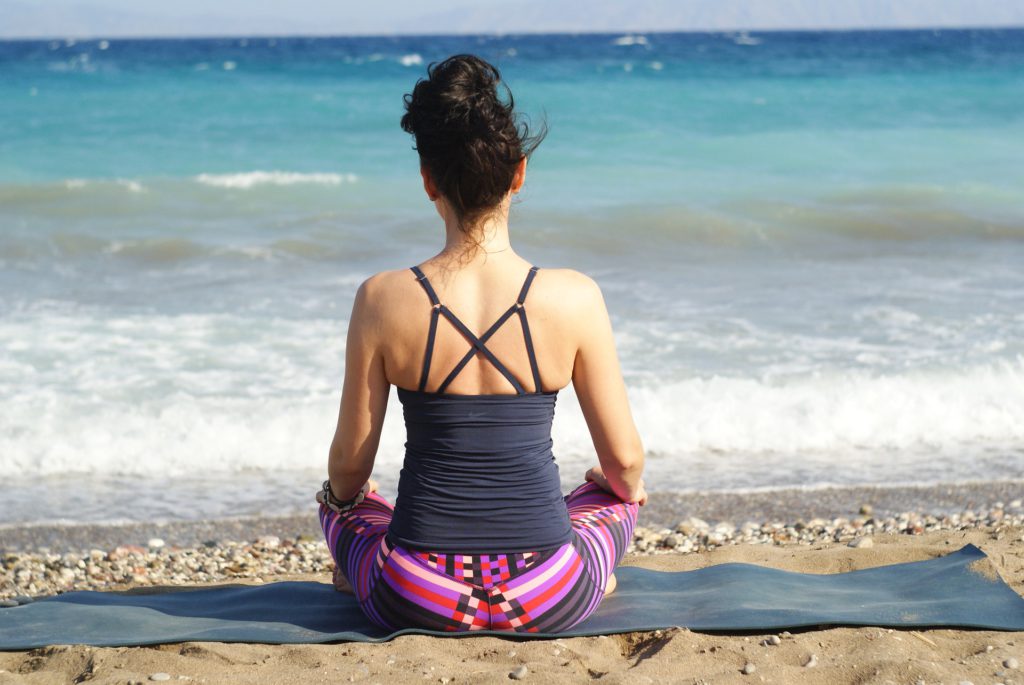
What is stress and anxiety?
Stress is our body’s internal response to what it perceives as a potential threat. Before industrialisation, this mechanism was essential for our survival as it put our body’s at a heightened awareness for us to decide whether to fight or flight aka run for safety if that’s what we perceived as the best solution to a threat. These days however, our perception of threat doesn’t usually come from the possibility of being in physical danger. It comes from a variety of sources including parenting, work demands, after school activities, managing a household, illnesses and so much more that can contribute to stress. Even from these kinds of stressors, our body activates it’s physiological responses that prepares us for fight or flight. In these cases however if the stressor doesn’t
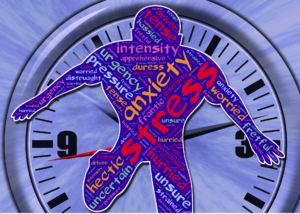
go away or our perception of it doesn’t shift, we can experience increased impact on our daily function. Sleep, health, mental health and well being can all be affected by our physiological response to stress.
Which makes it even more important to get on top of how we respond to perceived stress.
When under stress cortisol is released. This leads to the production of cytokines which then contributes to inflammation. When cytokines are present, our sleep is disrupted, depression and anxiety increases, feelings of fatigue and blood pressure also rises.
Benefits of Meditation to Relieve Stress and Anxiety
- Did you know that meditation can change your neural pathways which can help you manage stress and anxiety as you move forward with your daily meditations?
- Practicing meditation can also reduce the stress hormones cortisol and adrenaline. When our bodies have high levels of cortisol over a prolonged basis, it can impact our physical health as well as our mental health. It’s estimated that over 80% of visits to the doctor is stress related.
- Clearer mind – with practice of meditation on a daily or regular basis, you develop the skill to become more mindful of how you respond in situations so you are less stressed and more able to respond without the physical symptoms of stress. This also allows your brain to work from a more relaxed stated which allows for increased creativity.
- Meditation also contributes to enhanced self awareness.
- Meditation practiced daily can also help you sleep better, deeper and longer as your mind and body are more relaxed.
- Strengthened immune system – when we are in a relaxed state rather than heightened stressed stated, our immune system can manage better so we get sick less frequently.
- Can also decrease age-related memory loss and thus improved memory as we age.
- Has also been shown to increase kindness and compassion towards others.
- Meditation has also shown to fight addiction.
Timing
Find a time that works for you. Some people find first thing in the morning works for them, while others find it helps to find some quiet time during the day or just before going to sleep.
When creating a new habit, it can take a few weeks for you to remember to do things consistently. So in the beginning I would recommend you set a reminder on your device on a daily basis to make sure you get round to doing your meditation as a way of developing your stress and anxiety coping strategy.
Value of Breathing

Just breathe! Is it really that simple?
Not for some actually. But stay with me here. Even if you are experiencing anxiety and think your breathing is slow, do yourself a favor:
- Breathe in for 5 seconds, hold it for 2 seconds then let the air out for as long as you need to.
Do this at least 3 times before allowing your breath to return to its regular pace. Notice what happened for you. Was your breathing actually slow or did this exercise slow your breathing down a bit more? Often when we experience anxiety and stress, our breathing increases and we simply aren’t aware of doing that. It also means our brain get less precious oxygen which also affects our logical brain for thinking.
Breathing in meditation is an important step in slowing down your brainwaves and allows your body to relax.
Relax the Muscles
When you’re awake at night having trouble going to sleep, have you ever noticed what your muscles are like? If you haven’t noticed before try to remember to check them if you’re struggling to go to sleep. From personal experience, every time I can’t get back to sleep during the night, I check my muscles especially around my neck and shoulders and guess what? They’re tense as anything!!!
So to help with this issue, you can either listen to a guided meditation on youtube that guides you through your muscles and help you focus on releasing all of your muscles from head to toe. Or you can do your own body scan, noticing where you feel any tension and consciously release those muscles. This will also help you relax enough to get to sleep if that’s what the issue is for you.
Clear the Mind
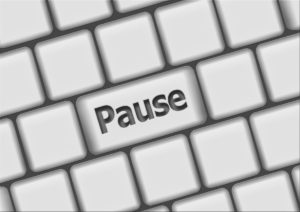
This can be a tricky one. Especially when one is experiencing stress and anxiety. The trick here is to learn how to sit with the thoughts that are there instead of resist them. Have you ever found that an unpleasant thought keeps going round and round and round in your mind? I know I have on occasion. When you notice this happening, what do you usually do with this thought? I’ve found that people tend to resist it. What I mean by this, is they try to tell it to go away, or try to change what happened, so it keeps being stuck in their. When we try to change it, push it away, fight it being there, our thoughts stays there. Do you know why? It’s because we are focussing on it, which makes it stay there. When you don’t focus and resist it you can accept it being there. Then the fight to get rid of the thought dies down. Acceptance is the key.
Did you know that thoughts also, dare I say it…aren’t real. You can’t find them in the brain when one has an autopsy. They simply aren’t a physical thing. They come and go. That also means you won’t be stuck with these thoughts unless you choose to keep focussing on them. Yes it is a choice what you focus on. Especially if you choose to remind yourself of the thought. This might be confronting to some, that’s okay. It’s something to think about and consider as a possibility if you are looking at how to shift those ongoing thoughts.
So when you’re practicing meditation and you have ongoing thoughts, simply acknowledge the thought being there rather than resist it. Acknowledge it and thank it for it’s message. Don’t get caught up in any arguments with the thought, simply notice it there. Then focus on your breathing as a way to bring yourself back to the present moment and what you’re doing.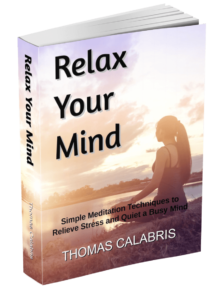
Be Present
One of the things to be mindful of when practicing meditation to relieve stress and anxiety is to be present. This means focus on this actual moment in time. What you’re currently doing in the moment. This is also how to bring yourself back from the stress and anxiety which is focussed on future worries and instead focus on just this moment.
An effective way to do this is to focus on your breathing. You can’t take a breath from the past, you can’t take a breath from the future, you can only breathe in the present. Bringing your focus to your breathing is a way to anchor yourself in the present. For more strategies of breathing and being present have a read of this post.
Two Main Styles of Meditation
Focussed attention meditation – focuses on single attention to a single object, sound, visualisation, breath, or thought. The goal is to reduce the thoughts in the mind through saying a word over and over, or focussing on your breathing, or listening to a calming sound.
Open-monitoring meditation – this involves focussing on a broader awareness of your environment, sensations, self awareness and even noticing your thoughts and feelings instead of suppressing them.
For guided meditations and ideas for how to meditate get your copy of Relax Your Mind ebook through this link or click on the banner below.
Conclusion
So living with stress and anxiety isn’t very fun and it has a physiological response to the body which over time will lead to unwanted health problems, potential mental health issues and sleep deprivation. So learning how to meditate to relieve stress and anxiety is essential to living a more relaxed, peaceful, stress-free life where you can live in the moment and handle stressful situations in a healthy way.
Have you used meditation as a way to manage your stress and anxiety? I would love to hear your experience in the comments below.

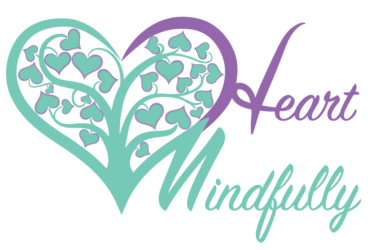
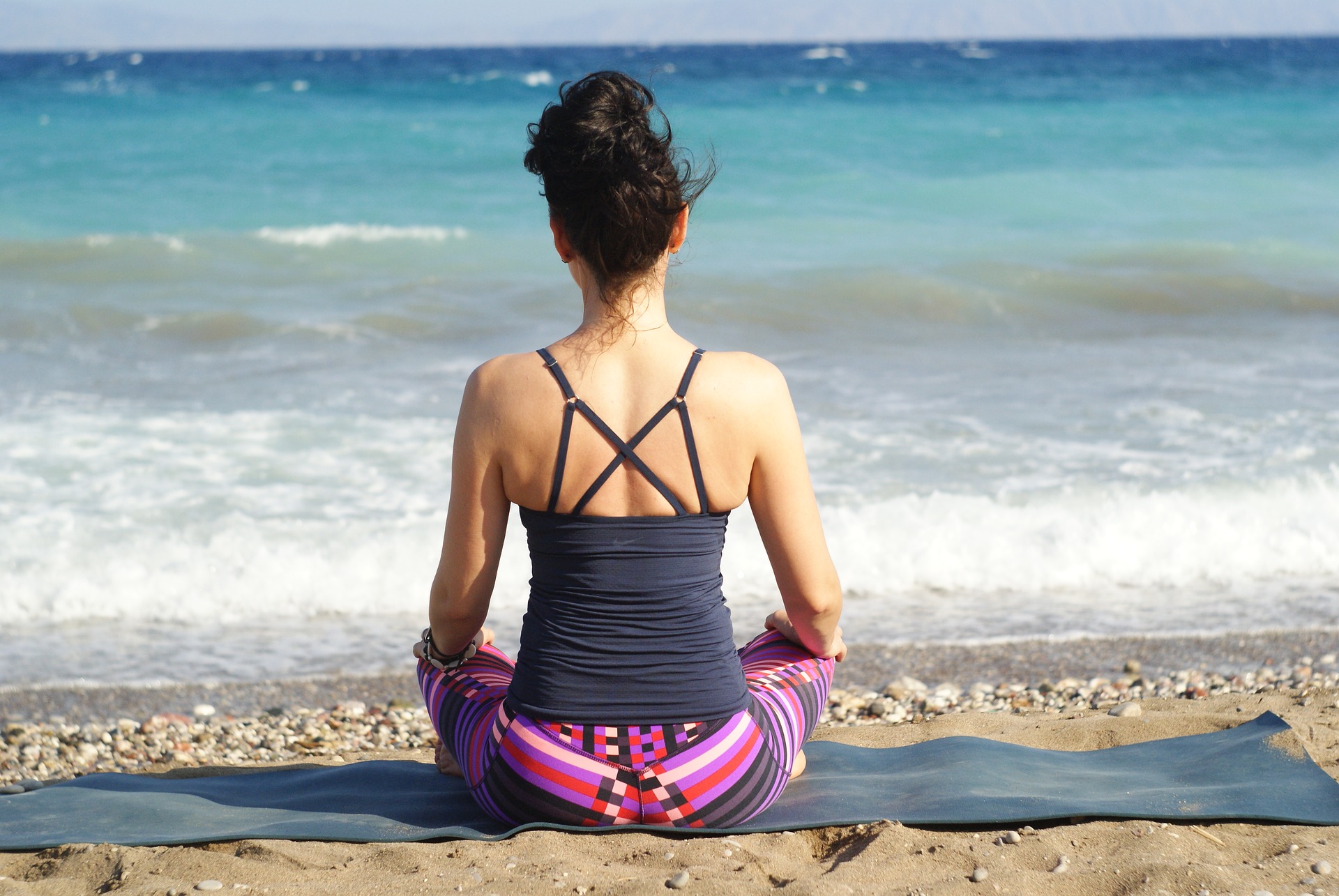

I have turned to meditation here and there at times when I feel overwhelmed with anxiety, however, I struggle actually incorporating it into my daily routine to really reap the benefits of it long term. I really want to find a way to work it into my every day schedule, however, I struggle to really find time to prioritize it. 🙁 I have used an app that provided daily reminders, however, I tended to ignore them if I happened to be busy at the exact moment. *sigh*
Hi Louise, thanks for stopping by. It can be a challenge getting into a routine and incorporating something new in that routine. It’s hard enough getting through the day hey! The daily app is a good start to remind you to do your meditation and hopefully when you can stop for a few mins during your day that can be your ‘me time’ for meditation. It doesnt have to be long, just enough for your brain and body to slow down for a few minutes. Áll the best ~ Kat
I really enjoyed reading this post Kat as I’m someone who also believes in the power of meditation. I suffered from high blood pressure a few years ago resulting in a stroke. I’m fine now, and practice deep breathing if I feel anxious. It works every time, making me feel calm. I also find guided meditation very relaxing and helps me focus on work.
Hi Kathy, thanks for sharing your thoughts, I’m glad you enjoyed reading this post. It’s awesome that you’re blood pressure has come down and you’ve been able to incorporate meditation when you notice feeling anxious. Well done for listening to your body. ~ Kat
Excellent article. I was a sceptic till recently but have discovered that meditation is not just a great reliever of anxiety but also improves my focus and productivity throughout the day. I normally spend a few minutes each morning focusing inwards while taking in fresh morning air and it makes my day wonderful.
Thanjs for the share
Hi Joshi, I’m so glad you’ve come round to the value of meditation and are now incorporating it into your daily routine. That’s an awesome effort as it can be quite challenging working something new into a daily routine. It sounds like you’ve been able to have a refreshing start to your day which has had a positive impact on your life, well done 🙂 ~ kat
Great Post. I always see meditation the way you describe it at the begging. like something far from “regular person”. I was really surprise about how importan is breathing here and simple at the same time. I have to say that I did the breathing exercise you said, and to be honest I got calm! It´s kind of magic how affected we can be due to our thoughts. Some time I find my self spinning around a conversation with my self and “feell” that conversation, and I can see that this exercise you describe can help me cut the circle. Thank you for the article
Hey Pablo, thanks for stopping by and sharing your thoughts. I’m so glad you’ve been able to get some benefit from this post and you’ve let me know about that. I really appreciate it. So now, hopefully, you’ll be able to remember the breathing exercise in your every life, and bring yourself back to the present when you need to. Cheers ~kat
Thanks for this very informative article.
I’ve often thought about adding meditation to my schedule but have been putting it off. This has given me the motivation that I need to make a definate committment to starting.
I follow the keto diet and I’m very interested in health, so it’s good to know that meditation is good for your immune system too.
Hi Judy, thanks for sharing. I too follow a keto diet, and have found that my immune system is fantastic as I haven’t had a cold in 3 years. I also put it down to the regular meditations I do on a daily basis, as I am able to keep myself calm even during times of stress. It certainly helps with self awareness. I’ve got another blog where I posted an article on keto and the immune system here if you’re interested. All the best.
Hi Kat,
Thanks for posting! I’ve just started out on my meditation journey with headspace and I’m loving it. Although, to be honest I’m very disciplined about it. What you said about timing and finding the same time to do it everyday is a great idea and I’ll definitely try that out!
Thanks for the great content!
Hi Wynand, thanks for stopping by. Great timing that you’ve just started your own meditation journey and you found us! Creating a routine will help you incorporate meditation and get you used to practicing it as part of your every day activities. I would love to hear back from you about any changes you notice in how you feel and your well-being. ~kat
Meditation is a great help for stress and anxiety, and more people should do it. I think some people don´t want to meditate, because they think about the Buddhist monks you mentioned, “meditation is for hippies” or something silly like that. Well, that´s their problem, they don´t know what they´re missing.
I´ve done yoga for a long time, and also meditation alongside it. Meditation is really something you can do sitting at your desk, when you´re stressed from work. I find it hard to sit for a long meditation, but even short meditation sessions are helpful. Even the slow breathing you mentioned helps. I actually did it right away when I read about it, and I felt instantly calmer.
Thanks for a great article!
Hi, Kat.
Thank you so much for sharing this beautiful post with us. Yes, I can add to this topic, as I used to suffer from panic attacks and the associated agoraphobia. The toughest part of getting into a meditative state was always to shift the focus from my panic attack symptoms.
I mean, my guided meditations began with taking three deep breaths, lol. That, at a moment where I was convinced that I was going to suffocate! I guess you get the picture now.
Anyway, it took many months until I was able to control this. right at this point, I’m having absolutely no issues with this anymore. On the contrary, meditation is my ultimate go-to cure when I feel anxiety coming up.
It is essential to put our thoughts and worries on “Pause” for a few minutes every day in our hectic world. O only had great experiences with meditation, and I’d suggest it to anyone I a heartbeat – especially if someone is prone to anxiety, or worse, panic attacks.
Thanks, again, for this lovely post.
I’m sending you lots of harmony, happiness and tranquillity.
Sincerely,
Keryn
Hi Keryn, thanks for sharing your journey with anxiety. It’s a tough one when we are in the middle of a panic attack. Without awareness that it is possible to manage these symptoms, it can be very intense and daunting. You know first hand that despite experiencing panic attacks, you were able to work through them with the value of meditation and get to a point of no longer experiencing their intesity. Well done for not giving up on how to manage the panic attacks, and instead find a new strategy which continues to help you to this day. Many blessings and peace for you too Keryn ! ~kat
Kat,
Great insights to reducing stress! I’ve recently gotten into mindfulness training and they talked about the same things you talked about with the focused-related or more broad approach to meditation. That certainly has reduced my anxiety. I can tell you’re well-informed about reducing anxiety. It’s a liberating feeling to be able to control your own body’s breathing and to slow down a little to assess a stressful situation. Thanks for your insights!
Hi Bobby, it’s great you’re already doing mindfulness training! More people could benefit from its simplicity. The benefits are well worth the learning. I’m glad you’re able to feel a sense of calm and liberation being able to maintain and control your body through a stressful situation. This will help you make valuable decisions by keeping your logical part of your brain engaged. Thanks for stopping by and sharing your experiences with mindfulness and meditation 🙂 ~kat
Great post! I love meditation and I use it during the day, as well as to help me get back to sleep if I wake up in the middle of the night.
You have a lot of great tips here, but my favorite is to be present. It is super hard in this world, so I really have to practice it. I am finding a lot more peace of mind since I have.
Thank you!
I have to agree with you, that being present is the most relevant and valuable way to calm the nervous system. Too often our thoughts go off in their own direction and wreak havoc on how we feel unless we are consciously bringing them back to the present. It’s great that you’ve been able to find this of value for you 🙂 ~kat